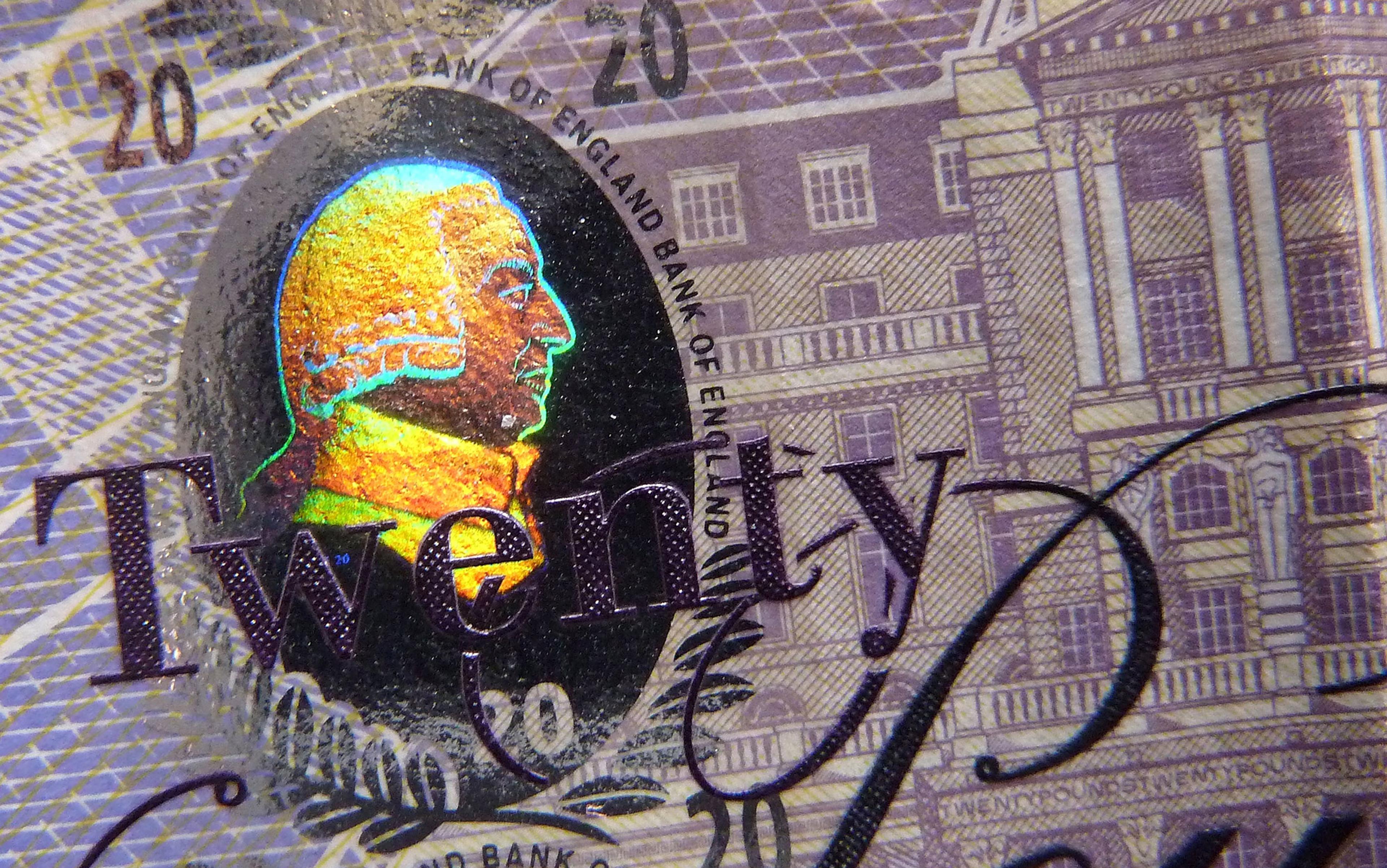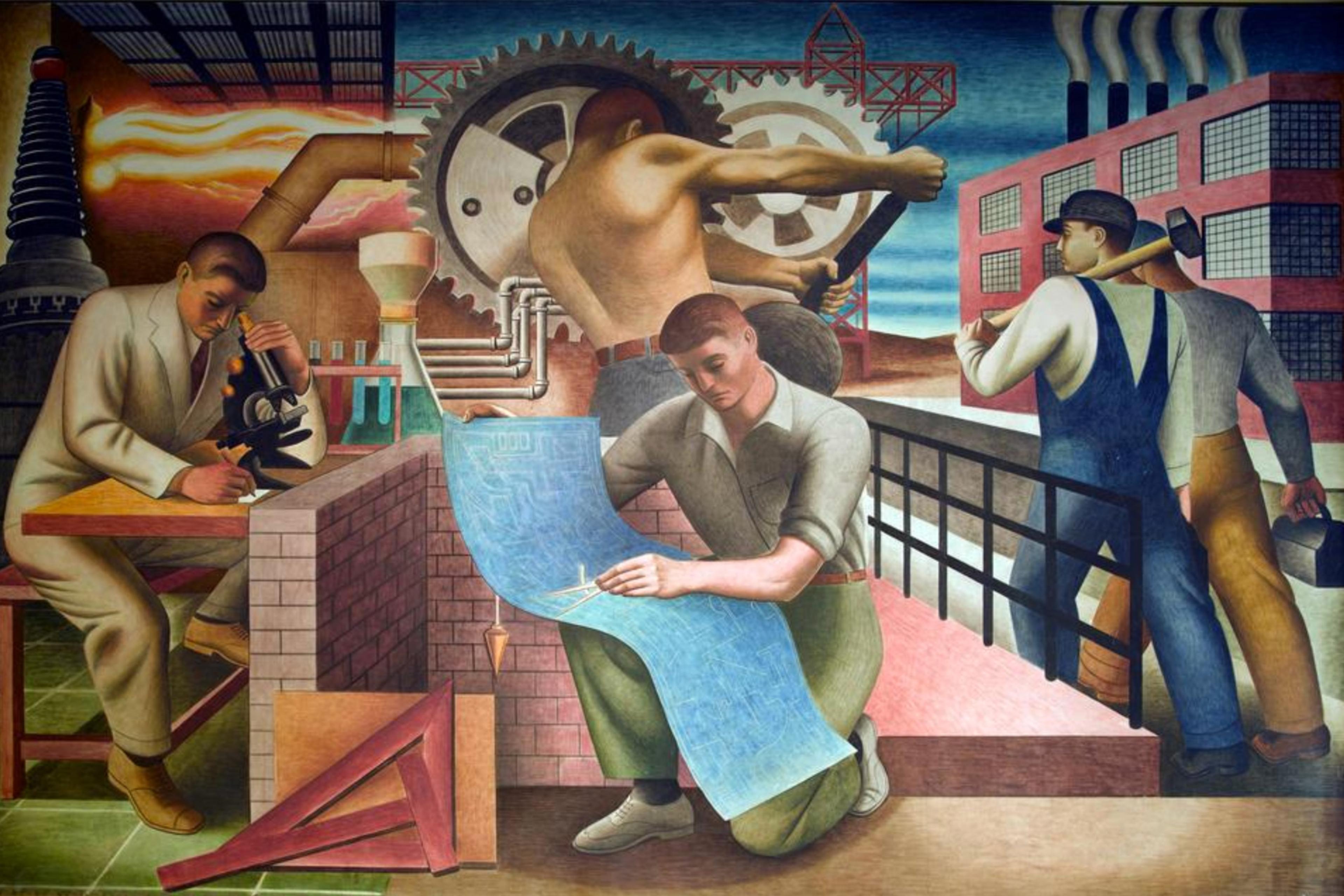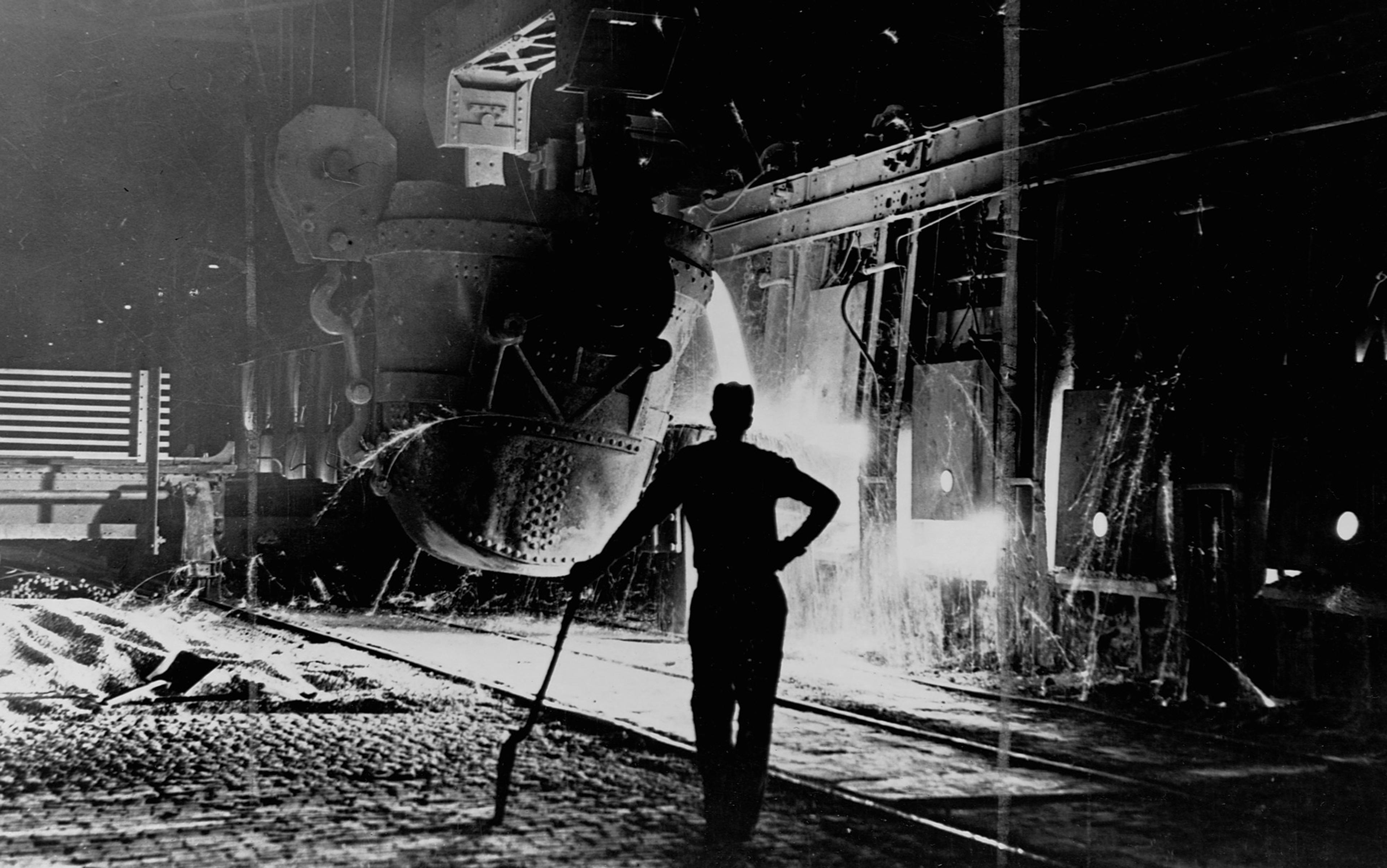If you’ve heard of one economist, it’s likely to be Adam Smith. He’s the best-known of all economists, and is typically hailed as the founding father of the dismal science itself.
Furthermore, he’s usually portrayed as not only an early champion of economic theory, but of the superiority of markets over government planning. In other words, Smith is now known both as the founder of economics, and as an ideologue for the political Right.
Yet, despite being widely believed, both these claims are at best misleading, and at worst outright false.
Smith’s popular reputation as an economist is a remarkable twist of fate for a man who spent most of his life as a somewhat reclusive academic thinker. Employed as professor of moral philosophy at the University of Glasgow, the majority of Smith’s teaching was in ethics, politics, jurisprudence and rhetoric, and for most of his career he was known for his first book, The Theory of Moral Sentiments (1759). His professional identity was firmly that of a philosopher – not least because the discipline of ‘economics’ didn’t emerge until the 19th century, by which time Smith was long dead. (He died in July 1790, just as the French Revolution was getting into full swing.)
Admittedly, Smith’s reputation as an economist isn’t entirely mysterious. His oft-quoted An Inquiry into the Nature and Causes of the Wealth of Nations (1776) was undoubtedly important in the eventual formation – in the next century – of the discipline of economics. But even here things are not as straightforward as they appear. For The Wealth of Nations – a 1,000-page doorstopper that blends history, ethics, psychology and political philosophy – bears little resemblance to the ahistorical and highly mathematical nature of most current economic theory. If anything, Smith’s best-known book is a work of political economy, a once-prevalent field of enquiry that suffered a striking decline in the latter half of the 20th century.
Smith’s reputation, however, began to get away from him early on. Shortly after publication, The Wealth of Nations was fêted in the British Parliament by the Whig leader Charles James Fox. Ironically, Fox later admitted that he had never actually read it (few subsequent non-readers of the book have showed such candour, despite plenty of them citing it). Indeed, Smith suspected that those quickest to sing his praises had failed to understand the main arguments of his work. He later described The Wealth of Nations as a ‘very violent attack … upon the whole commercial system of Great Britain’. Despite this, his vocal political cheerleaders in Parliament continued to prop up the very system that Smith was railing against.
Yet if Smith was disappointed by his work’s immediate reception, he would likely have taken even less cheer from the future uses to which his name would be put. For it has been his fate to become associated with the strain of Right-wing politics that rose to dominance in the early 1980s, and which continues to exert a strong influence on politics and economics today. Usually known as neoliberalism, this development is most famously associated with Ronald Reagan and Margaret Thatcher. But it is in fact a movement with deep intellectual roots, in particular in the mid-century writings of the economists Friedrich Hayek and Ludwig von Mises. Later, the Chicago economist Milton Friedman and the British policy adviser Keith Joseph championed it during the 1980s, as did the extensive network of academics, think tanks, business leaders and policymakers associated with the Mont Pelerin Society.
Neoliberals often invoke Smith’s name, believing him to be an early champion of private capitalist endeavour, and a founder of the movement that seeks (as Thatcher hoped) to ‘roll back the frontiers of the state’ so as to allow the market to flourish. The fact that there is a prominent Right-wing British think tank called the Adam Smith Institute – which since the 1970s has aggressively pushed for market-led reforms, and in 2016 officially rebranded itself a ‘neoliberal’ organisation – is just one example of this tendency.
It is certainly true that there are similarities between what Smith called ‘the system of natural liberty’, and more recent calls for the state to make way for the free market. But if we dig below the surface, what emerges most strikingly are the differences between Smith’s subtle, skeptical view of the role of markets in a free society, and more recent caricatures of him as a free-market fundamentalist avant-la-lettre. For while Smith might be publicly lauded by those who put their faith in private capitalist enterprise, and who decry the state as the chief threat to liberty and prosperity, the real Adam Smith painted a rather different picture. According to Smith, the most pressing dangers came not from the state acting alone, but the state when captured by merchant elites.
The context of Smith’s intervention in The Wealth of Nations was what he called ‘the mercantile system’. By this Smith meant the network of monopolies that characterised the economic affairs of early modern Europe. Under such arrangements, private companies lobbied governments for the right to operate exclusive trade routes, or to be the only importers or exporters of goods, while closed guilds controlled the flow of products and employment within domestic markets.
As a result, Smith argued, ordinary people were forced to accept inflated prices for shoddy goods, and their employment was at the mercy of cabals of bosses. Smith saw this as a monstrous affront to liberty, and a pernicious restriction on the capacity of each nation to increase its collective wealth. Yet the mercantile system benefited the merchant elites, who had worked hard to keep it in place. Smith pulled no punches in his assessment of the bosses as working against the interests of the public. As he put it in The Wealth of Nations: ‘People of the same trade seldom meet together, even for merriment and diversion but the conversation ends in a conspiracy against the public, or in some contrivance to raise prices.’
The merchants had spent centuries securing their position of unfair advantage. In particular, they had invented and propagated the doctrine of ‘the balance of trade’, and had succeeded in elevating it into the received wisdom of the age. The basic idea was that each nation’s wealth consisted in the amount of gold that it held. Playing on this idea, the merchants claimed that, in order to get rich, a nation had to export as much, and import as little, as possible, thus maintaining a ‘favourable’ balance. They then presented themselves as servants of the public by offering to run state-backed monopolies that would limit the inflow, and maximise the outflow, of goods, and therefore of gold. But as Smith’s lengthy analysis showed, this was pure hokum: what were needed instead were open trading arrangements, so that productivity could increase generally, and collective wealth would grow for the benefit of all.
Even worse than this, Smith thought, the merchants were the source of what his friend, the philosopher and historian David Hume, had called ‘jealousy of trade’. This was the phenomenon whereby commerce was turned into an instrument of war, rather than the bond of ‘union and friendship’ between states that it ought properly to be. By playing on jingoistic sentiments, the merchants inflamed aggressive nationalism, and blinded domestic populations to the fact that their true interests lay in forming peaceful trading relationships with their neighbours.
The peace and stability of the European continent was imperilled by the conspiracies of the merchants, who goaded politicians into fighting wars to protect home markets, or acquire foreign ones. After all, being granted militarily-backed private monopolies was far easier than having to compete on the open market by lowering prices and improving quality. The merchants in this manner constantly conspired to capture the state, defrauding the public by using political power to promote their own sectional advantage.
The invisible hand was invoked not to draw attention to the problem of state intervention, but of state capture
Indeed, Smith’s single most famous idea – that of ‘the invisible hand’ as a metaphor for uncoordinated market allocation – was invoked in precisely the context of his blistering attack on the merchant elites. It is certainly true that Smith was skeptical of politicians’ attempts to interfere with, or bypass, basic market processes, in the vain hope of trying to do a better job of allocating resources than was achievable through allowing the market to do its work. But in the passage of The Wealth of Nations where he invoked the idea of the invisible hand, the immediate context was not simply that of state intervention in general, but of state intervention undertaken at the behest of merchant elites who were furthering their own interests at the expense of the public.
It is an irony of history that Smith’s most famous idea is now usually invoked as a defence of unregulated markets in the face of state interference, so as to protect the interests of private capitalists. For this is roughly the opposite of Smith’s original intention, which was to advocate for restrictions on what groups of merchants could do. When he argued that markets worked remarkably efficiently – because, although each individual ‘intends only his own gain, and he is in this, as in many other cases, led by an invisible hand to promote an end which was no part of his intention’ – this was an appeal to free individuals from the constraints imposed upon them by the monopolies that the merchants had established, and were using state power to uphold. The invisible hand was originally invoked not to draw attention to the problem of state intervention, but of state capture.
Smith was, however, deeply pessimistic about the stranglehold that the merchants had managed to exert over European politics, and despaired of it ever being loosened. Accordingly, he labelled his preferred alternative – of liberal markets generating wealth to be passed on to all members of society – a ‘Utopia’ that would never come to pass. History has to some extent proved him wrong on this score: we now live in an era of comparative market freedom. But nobody should deny that merchant conspiracy, and the marriage of the state to what we now call corporate power, remain defining features of our present-day political and economic reality.
In any case, Smith’s hostility to the merchants is a long way removed from a Reagan-style championing of the entrepreneurial capitalist hero, she who needs only to be released from the constraints of the state to lead us to the sunlit uplands of economic growth. On the contrary, Smith’s analysis implies that a free society with a healthy economy is going to need to put fetters on economic elites if the invisible hand is to have any chance of doing its paradoxical work.
Does this, then, make Smith an early proponent of the political Left? No, and it would be a serious mistake to draw that conclusion. The truth is both more complex, and more interesting, than that.
Although Smith was deeply critical of the way that the merchants conspired to promote their own advantage at the expense of the rest of society, he was under no illusion that political actors might successfully replace private merchants as the necessary conduits of economic activity.
Certainly, when merchants were allowed to rule as sovereigns – as the British East India Company had been permitted to do in Bengal – the results were disastrous. ‘Want, famine and mortality’, themselves the results of ‘tyranny’ and ‘calamity’, had been unleashed on India, all products of an ‘oppressive authority’ based on force and injustice. Under absolutely no circumstances, Smith thought, should merchants be put in charge of politics. Their monopolistic conspiracies would be ‘destructive’ to all countries ‘which have the misfortune to fall under their government’.
On Smith’s final analysis, the merchants were a pernicious but necessary part of large-scale economies
Nonetheless, something like the reverse was also true: politicians made for terrible merchants, and ought not to attempt to take over the systematic running of economic affairs. This was a product of the structural predicament faced by political leaders, whom Smith claimed have ‘scarce ever succeeded’ in becoming ‘adventurers in the common branches of trade’, despite often having been tempted to try, and often from a genuine desire to better their nation’s condition.
Politicians, according to Smith, were much poorer judges of where and how to allocate resources than the aggregated outcome of individuals spontaneously undertaking free exchange. As a result, in matters of trade it was usually folly for politicians to try to replace the vast network of buyers and sellers with any form of centralised command. This, however, included precisely those networks structured around the profit-seeking activities of merchant elites.
On Smith’s final analysis, the merchants were a potentially pernicious, but entirely necessary, part of the functioning of large-scale economies. The true ‘science of a statesman or legislator’ consisted in deciding how best to govern the merchants’ nefarious activities. Effective politicians had to strike a balance between granting economic elites the liberty to pursue legitimate commercial activities, while also applying control when such activities became vehicles for exploitation. In other words, Smith was very far from asking us to put our faith in ‘entrepreneurs’, those supposed ‘wealth-creators’ whom neoliberalism looks to as drivers of economic prosperity. On the contrary, giving the entrepreneurs free reign would be rather like putting the foxes in charge of the chicken coup.
Crucially, however, Smith did not offer up any kind of premeditated plan regarding how to strike the right balance between commercial freedom and watchful political control. On the contrary, he pressed home the deep underlying difficulties of the situation that commercial societies found themselves in.
Political actors, Smith claimed, were liable to be swept up by a ‘spirit of system’, which made them fall in love with abstract plans, which they hoped would introduce sweeping beneficial reform. Usually the motivations behind these plans were perfectly noble: a genuine desire to improve society. The problem, however, was that the ‘spirit of system’ blinded individuals to the harsh complexities of real-world change. As Smith put it in The Theory of Moral Sentiments in one of his most evocative passages:
[The man of system] seems to imagine that he can arrange the different members of a great society with as much ease as the hand arranges the different pieces upon a chessboard. He does not consider that the pieces upon the chessboard have no other principle of motion besides that which the hand impresses upon them; but that, in the great chessboard of human society, every single piece has a principle of motion of its own, altogether different from that which the legislature might choose to impress upon it. If those two principles coincide and act in the same direction, the game of human society will go on easily and harmoniously, and is very likely to be happy and successful. If they are opposite or different, the game will go on miserably, and the society must be at all times in the highest degree of disorder.
Smith’s point is easily misunderstood. At first glance, it can look like a modern Right-wing injunction against socialist-style state planning. But it is much more subtle than that.
What Smith is saying is that in politics any preconceived plan – especially one that assumes that the millions of individuals composing a society will just automatically go along with it – is potentially dangerous. This is because the ‘spirit of system’ infects politicians with a messianic moral certainty that their reforms are so necessary and justified that almost any price is worth paying to achieve them.
Thatcher’s restructuring of the economy was as much a product of the ‘spirit of system’ as any Soviet strategy
Yet it is a short step from this to discounting the very real harm that a plan can unleash if it starts to go wrong – and especially if the ‘pieces upon the chessboard’ act in ways that resist, or subvert, or confound, the politician’s scheme. This is because the ‘spirit of system’ encourages the sort of attitude captured in such cheap sayings as ‘You can’t make an omelette without breaking eggs’. In other words, that inconvenient opponents and bystanders can be sacrificed to an overriding moral vision.
Smith was warning against all abstract plans alike. Certainly, his outlook urges skepticism about such strategies as taking over the industrial base of a state, presuming to know what goods citizens will want and need over the next five years, and thereby trying to eliminate the market as a mechanism for resource allocation. But it likewise views with deep suspicion a plan to rapidly privatise previously state-owned industries, exposing millions of citizens to the ravages of unemployment and the attendant destruction of their communities. In other words, while she certainly didn’t realise it, Thatcher’s violent restructuring of the British economy during the 1980s was as much a product of the ‘spirit of system’ as any piece of top-down Soviet industrial strategy.
The message that Smith conveys cuts across party and ideological lines, and applies to both Left and Right. It is about a pathological attitude that politicians of all stripes are prone to. If not kept in check, this can be the source not just of disruption and inefficiency but of cruelty and suffering, when those who find themselves on the wrong side of the plan’s consequences are forced by the powerful to suffer them regardless. Smith in turn urges us to recognise that real-world politics will always be too complex for any prepackaged ideology to cope with. What we need in our politicians is careful judgment and moral maturity, something that no ideology, nor any position on the political spectrum, holds a monopoly on.
In the fraught times that we now occupy, it is hard to believe that the careful and responsible political judges that Smith envisaged have much chance of emerging. (Does anybody in Western politics currently measure up?) Much more likely will be new men and women of system, with alternative abstract plans, seducing desperate electorates before attempting to impose their own forceful reforms, regardless of what the pieces on the chessboard happen to think or want.
Whether these reforms come from the Left or the Right might not, in the end, matter much. As Western economies continue to struggle, and politics becomes increasingly polarised, the results could yet be catastrophic. But if so, we should certainly not consign Smith to any parade of blame. On the contrary, he tried to warn us of the dangers that we face. It is time that we listened, a little more carefully, to what the real Adam Smith had to say.






